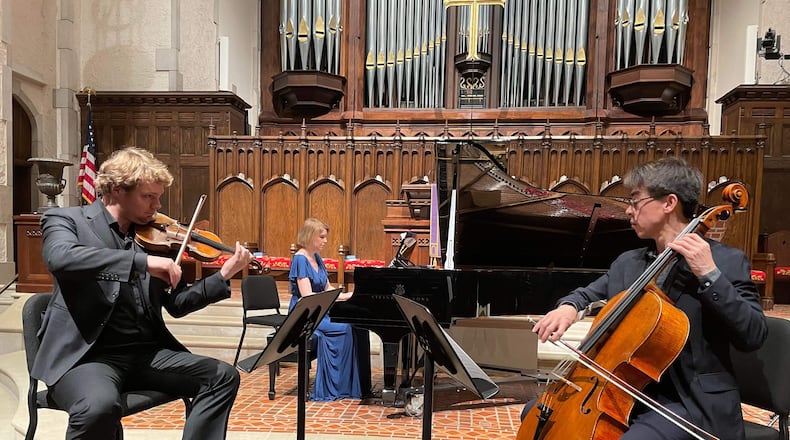The Georgian Chamber Players presented a captivating concert at First Presbyterian Church of Atlanta on Monday.
This, despite the unexpected replacement of cellist Rainer Eudeikis with Emory University artist-in-residence and Vega String Quartet co-founder Guang Wang. The sudden substitution initially introduced a subtle element of uncertainty to the evening’s proceedings, raising questions about how Wang would meld with the group. Although his technical acumen and accomplished background are beyond question, a chamber ensemble is a delicate thing, one prone to serious shifts in stylistic direction should the fragile membrane of its internal cohesion be compromised.
But the chemistry was instantaneous. When he joined Elizabeth Pridgen, pianist and Atlanta Chamber Players artistic director, and Atlanta Symphony Orchestra Concertmaster David Coucheron for Joseph Haydn’s “Gypsy Trio,” they may as well have been playing together for decades.
The piece is a prominent example of Haydn’s characteristically light, conversational tone. If there was any sense of imbalance in the piece, it was in Pridgen’s borderline inaudible presence. Perhaps it had more to do with the violin and cello being stationed so much closer to the audience, but the piano seemed at times to vanish from the sonic spectrum completely. This is certainly not without compositional precedent — the piece uses the piano as a sort of minimalist undercurrent, frequently eschewing counterpoint for a soft chordal attack that quietly emphasizes the more prominently displayed strings. Nevertheless, it was a pleasant opening to the evening.
Next, pianist Julie Coucheron joined Pridgen for a duet rendition of Czech Romantic composer Bedřich Smetana’s symphonic poem “The Moldau.” The second of Smetana’s six symphonic poem cycles “Má vlast” (”The Fatherland”), “The Moldau” serves as an auditory journey down the longest river in the Czech Republic with stops along the way for a farmer’s wedding, nighttime swims with mermaids, and explorations of medieval ruins, among other adventures.
I admit initial concern. I’m not usually a fan of compressing entire symphonic works into a singular tonal voice, and piano duets run the risk of dissolving into novelty acts if not properly handled. But Ms. Coucheron presented an insightful explanation of the work before the performance, and the duo’s playing was so complementary that it very nearly sounded like a single person.
Both have a gentle, rolling sort of attack on the instrument that is well suited to a piece so dreamlike in tone and indispensable to the performance of a piano duet. “The Moldau” becomes reminiscent of Liszt’s “Years of Pilgrimage” when performed in this minimalist context, and the pianists’ gentle intermingling of tones captured the sonic atmosphere of the piece wonderfully, with cascades of sixteenth notes creating the sounds of babbling brooks and raging rapids throughout.
Credit: Niki Baker
Credit: Niki Baker
The evening’s final piece was a rousing performance of Johannes Brahms’ Piano Quintet in F Minor, Op. 34, played by the Coucheron siblings, Wang, violinist Jessica Wu and violist Zhenwei Shi. Considered by many to be Brahms’ crowning achievement in the chamber format, the work contains all of his signature panache: the brooding, sonorous low end and the frequent unleashing of savage chaos interspersed with almost disorienting moments of calm.
To my mind, the piece is Bach-lite compared to the morbid grandeur of his Requiem, more like a survey of his compositional arsenal rather than a deep dive into the true majesty of his creativity. Yet, the Chamber Players turned in an engaging rendition, with much of the success again owed to Wang, who gave the bass register all the fire and fury it deserved, dominating the room even as his parts were sporadic and structural. Whatever my own misgivings about Brahms’ 34th Opus, its ever-escalating moments of controlled chaos were undeniable.
With this concert, the Georgian Chamber Players have established themselves once more as a leading force in the Atlanta classical scene.
Jordan Owen began writing about music professionally at the age of 16 in Oxford, Mississippi. A 2006 graduate of the Berklee College of Music, he is a professional guitarist, bandleader and composer. He is currently the lead guitarist for the jazz group Other Strangers, the power metal band Axis of Empires and the melodic death/thrash metal band Century Spawn.
Credit: ArtsATL
Credit: ArtsATL
MEET OUR PARTNER
ArtsATL (www.artsatl.org), is a nonprofit organization that plays a critical role in educating and informing audiences about metro Atlanta’s arts and culture. Founded in 2009, ArtsATL’s goal is to help build a sustainable arts community contributing to the economic and cultural health of the city.
If you have any questions about this partnership or others, please contact Senior Manager of Partnerships Nicole Williams at nicole.williams@ajc.com.
About the Author
Keep Reading
The Latest
Featured



